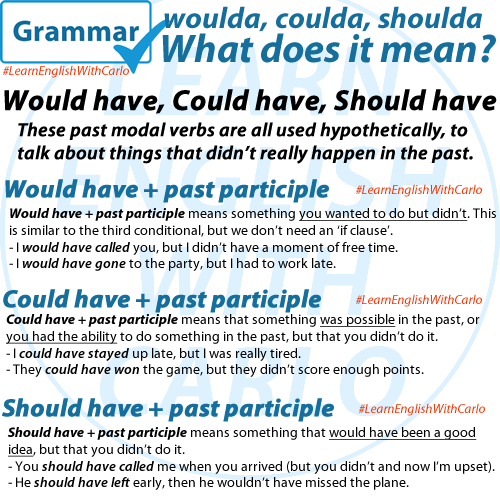You may have heard native English speakers use phrases like woulda, coulda, or shoulda. But what do they mean? These are informal, spoken forms of would have, could have, and should have. These past modal verbs are used to talk about things that didn’t happen, but that we imagine or wish had been different.

Let’s break down what each one means and how to use them.
WOULD HAVE + PAST PARTICIPLE
When we use would have + past participle, we are talking about something we wanted to do, but didn’t actually do. It’s similar to the third conditional, but without the need for an “if” clause.
Examples:
- I would have called you, but I didn’t have a moment of free time.
- I would have gone to the party, but I had to work late.
In these sentences, the speaker is imagining a different situation, but it didn’t happen because of other circumstances.
COULD HAVE + PAST PARTICIPLE
We use could have + past participle to talk about something that was possible in the past, or when someone had the ability to do something, but didn’t.
Examples:
- I could have stayed up late, but I was really tired.
- They could have won the game, but they didn’t score enough points.
Here, the speaker talks about missed possibilities—things that could have happened, but didn’t.
SHOULD HAVE + PAST PARTICIPLE
Should have + past participle expresses regret or advice about something that would have been a good idea in the past, but wasn’t done.
Examples:
- You should have called me when you arrived (but you didn’t, and now I’m upset).
- He should have left early; then he wouldn’t have missed the plane.
In these examples, should have is used to give a sense of what the right action would have been, but it’s too late now to change the past.
Summary:
- Would have talks about things we wanted to do, but didn’t.
- Could have talks about possibilities or abilities we didn’t use.
- Should have talks about things that would have been good ideas, but weren’t done.
Understanding these past modals helps you discuss hypothetical situations and regrets about the past in English. So next time you hear someone say woulda, coulda, shoulda, you’ll know exactly what they mean!
